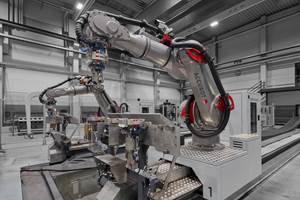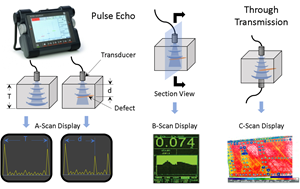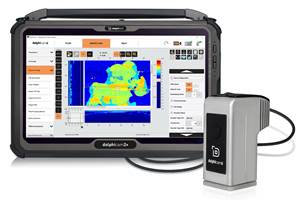Robotic NDT inspection solutions, services enhance multitasking capabilities
CAMX 2024: Matec Instrument Companies Inc. presents its range of nondestructive ultrasonic testing technologies, including robotic inspection systems for increased efficiency and reduced physical strain.
Share
Matec Instrument Companies Inc. (Northborough, Mass., U.S.) highlights its nondestructive ultrasonic testing solutions, including a full range of in-house services for every step of the process, from initial design through system commissioning and training. These solutions are tailored to the testing needs of industries such as aerospace, military, railroad, specialty metals and medical manufacturing.
According to the company, its robotic inspection systems can provide machine operators with increased efficiency, reduced physical strain and improved job satisfaction, as they are able to focus on more complex and engaging tasks. Clients can also experience optimized scalability, flexibility, quality and consistency, as well as time savings.
With the ongoing shortage of skilled machine operators, the company says that robotic integration is becoming essential in maintaining a quality workforce. Automated machine tendering can enable a single team member to oversee multiple systems simultaneously. This “one man, one cell” approach is said to deliver increased productivity at a lower cost than the traditional one-operator-per-system model.
Matec’s testing systems vary in size and complexity, from small laboratory tanks to advanced multi-axis immersion and gantry systems. Its solutions are intended to not only improve inspection accuracy and efficiency, but enhance safety and reduce downtime. Matec’s software engineers can also develop customized scan forms and algorithms specific to customers’ application demands.
Related Content
-
Automated robotic NDT enhances capabilities for composites
Kineco Kaman Composites India uses a bespoke Fill Accubot ultrasonic testing system to boost inspection efficiency and productivity.
-
Nondestructive inspection methods available to composites manufacturers
An overview of composite laminate inspection techniques ranging from manual testing methods to more advanced, noncontact options.
-
Ruckus Composites, Aerospace grows in-house composites machining, measurement and inspection
Recent in-house technology investments set Ruckus up to meet advanced composite inspection and precision machining demand.
Related Content
Automated robotic NDT enhances capabilities for composites
Kineco Kaman Composites India uses a bespoke Fill Accubot ultrasonic testing system to boost inspection efficiency and productivity.
Read MoreNondestructive inspection methods available to composites manufacturers
An overview of composite laminate inspection techniques ranging from manual testing methods to more advanced, noncontact options.
Read MoreRuckus Composites, Aerospace grows in-house composites machining, measurement and inspection
Recent in-house technology investments set Ruckus up to meet advanced composite inspection and precision machining demand.
Read MorePortable digital ultrasonic imaging achieves in-service, field and manufacturing inspection
CAMX 2023: 2D array ultrasonic NDT for composites, metals and other materials is made possible through Dolpitech’s dolphicam and dolphicam2+ matrix transducer technology.
Read MoreRead Next
Assembling the Multifunctional Fuselage Demonstrator: The final welds
Building the all-thermoplastic composite fuselage demonstrator comes to an end with continuous ultrasonic welding of the RH longitudinal fuselage joint and resistance welding for coupling of the fuselage frames across the upper and lower halves.
Read MoreComposites end markets: New space (2025)
Composite materials — with their unmatched strength-to-weight ratio, durability in extreme environments and design versatility — are at the heart of innovations in satellites, propulsion systems and lunar exploration vehicles, propelling the space economy toward a $1.8 trillion future.
Read MoreAll-recycled, needle-punched nonwoven CFRP slashes carbon footprint of Formula 2 seat
Dallara and Tenowo collaborate to produce a race-ready Formula 2 seat using recycled carbon fiber, reducing CO2 emissions by 97.5% compared to virgin materials.
Read More







